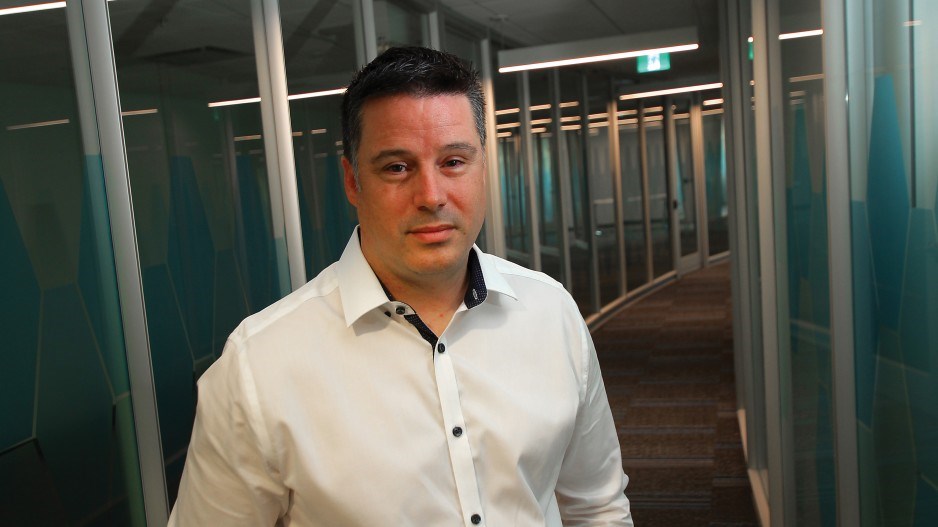Surrey’s Health and Technology District within Innovation Boulevard continues to attract unique medical device companies, but industry insiders say the overall community needs to change its culture to stay globally competitive.
Over the past six months, as many as 20 separate medical technology companies have set up spaces within Innovation Boulevard, intensifying competition for federal grants. Neuroscientist Ryan D’Arcy, who co-founded Innovation Boulevard, said one of the main hurdles for medical technology startups remains getting enough money to turn a good idea into a profitable business.
“Every company is at a different stage and every company has got a unique problem these days,” D’Arcy said. “And so there’s no one solution in how a company is going to develop optimally from an access-to-capital standpoint.”
D’Arcy said the sector needs to tamp down its fierce competition for capital, grants and investors.
“B.C.’s biggest challenge is it spends far too much energy in what I would call tribal warfare,” he said. “It competes amongst itself instead of joining the global race.”
To help change this, Innovation Boulevard devotes a lot of time and resources toward changing the culture to stress collaboration and the “understanding that it’s a global competition that we have to come together for,” he said.
D’Arcy added that health technology hubs in B.C. only hurt each other when they remain in their silos.
“There’s far too much ‘us versus them’ within the province,” he said. “And while that’s happening, countries like Israel and the U.S. and countries in Europe are just shooting right past us.”
One of the recent arrivals at the Health and Technology District is eTreatMD, a company whose first app is LiveWith Arthritis. The app uses a smartphone camera to take pictures of the user’s hand to record and track arthritis in conjunction with a clinician. The company is pursuing approval from Health Canada and the U.S. Food and Drug Administration.
Ramin Estifaie, a marketing and business development manager with eTreatMD, said he agrees with D’Arcy that there is room in the industry for closer collaboration.
“B.C. businesses, especially startups, are competing locally for investment, access to research facilities, clinicians willing to conduct pilot studies and clinical trials, skilled employees and government assistance programs,” Estifaie said. “They are very focused on their own individual barriers to progress, so it is often difficult to come together.”
Another company that recently set up shop within the Health and Technology District is Target Tape, started by University of British Columbia Sauder School of Business graduate Nick Seto during his final year of school in conjunction with an engineering student. Target Tape’s first product is X-Grid, designed for surgeons to better localize incisions by creating correlating grid patterns on the X-ray and the patient’s body.
The development of the firm’s second product, X-Line, which is aimed at solving the problem of distorted body-contour imaging that can occur in CT scans of obese patients, highlights the potential benefits of companies and agencies working more closely together.
“It was very useful to be in Surrey while we were developing X-Line,” Seto said. “The BC Cancer Agency was right across the street, and the radiotherapist and physicist we were working with were able to quickly test out prototypes and provide immediate in-person feedback. Some of the team at Innovation Boulevard were responsible for making the introduction.”
Seto said the biggest challenge facing Target Tape lies not in the product, but in showing how it can save time and money.
“I do think that to compete on a global scale, especially to gain more business in the U.S.A., a clear economic value proposition is needed to show savings and revenue increases for hospitals.”
ETreatMD, which originally set up in downtown Vancouver but has now shifted its focus to Surrey, has also benefited from close association with other organizations.
In May 2016, eTreatMD worked with the Arthritis Society to provide free access to a pilot study for its app. LiveWith Arthritis is now available via Apple’s (Nasdaq:AAPL) App Store, and plans are in the works for distribution through Google Play. Nick MacKinnon, the firm’s founder and vice-president of clinical product development, said the company is working on a number of other projects, among them apps for monitoring of skin ailments such as psoriasis and acne.
He said Surrey, with its large South Asian immigrant population, is a good location for clinical trials because the company aims to expand into Asian markets.
“We have a whole bunch of people [in Surrey] from Asia and South Asian backgrounds,” he said. “So [there are] different skin colours and skin types and skin histories that help us develop those markets. Whereas if you’re in a Midwest town in the U.S. you might not have that.”




